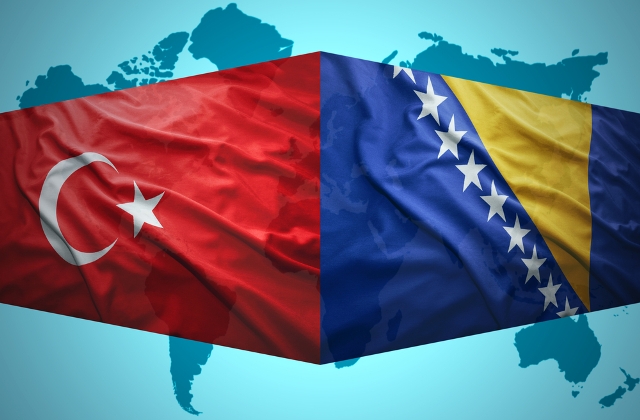Analysis: Türkiye’s foreign policy can benefit Bosnia and Herzegovina

Türkiye’s foreign policy can help Bosnia-Herzegovina in its development and in bolstering its international position, said Admir Lisica, a political researcher for the Balkan region.
“Türkiye’s foreign policy position is also important because through certain diplomatic activities, Türkiye can certainly help Bosnia-Herzegovina accelerate its development and improve its international position,” Lisica, a researcher of international policy and diaspora communities, told Anadolu Agency in an interview.
Ahead of an upcoming visit to the region by Turkish President Recep Tayyip Erdogan, Lisica said that Ankara had positioned itself as an extremely important country, asserting itself as one of the main mediators seeking to establish lasting peace in Ukraine.
“This position of Türkiye on the international scene tells us that its role in global processes is extremely important and even unavoidable in certain segments,” he said.
Erdogan is set to visit the capitals of Bosnia-Herzegovina, Serbia, and Croatia in a three-day mini Balkan tour starting.
Lisica expressed hope, however, that the Balkans will not need Türkiye or any other country to be peace mediators.
“We still have fresh wounds from the 1990s,” said Lisica, underlining the need for mediators to establish peace in the Balkans. “I believe that such times are behind us,” he said.
He added that Türkiye has been a sincere friend of Bosnia-Herzegovina and Bosniaks for over 30 years.
“Aug. 28 marked the 30th anniversary of the establishment of diplomatic relations between Bosnia-Herzegovina and Türkiye.
“The foundations of diplomatic relations were established a year before the independence of Bosnia-Herzegovina by President Alija Izetbegovic, who in the early 1990s, visited Turkish officials and activists such as Necmettin Erbakan and then-Turkish President Turgut Ozal,” recounted Lisica.
He said Erdogan has extremely friendly relations with the leader of the biggest Bosniak party in the country, Bakir Izetbegovic, helping to improve cooperation further.
“I hope that the cooperation between the two countries will be even more intense in the coming period, and Türkiye can certainly be of help to Bosnia Herzegovina,” he said.
On Türkiye’s infrastructure projects in Bosnia, Lisica emphasized that Türkiye had “done a lot to rebuild the country.”
Referring to Türkiye’s state aid body, he said the Turkish Cooperation and Coordination Agency (TIKA) invested millions in reconstruction throughout Bosnia and Herzegovina. “Also, Bosnia-Herzegovina has a certain trade exchange with Türkiye, which is extremely positive in the context of strengthening the economy.”
Investments and projects also help bring the two countries closer together and in maintaining mutual relations.
“Türkiye is present through its investments in Bosnia-Herzegovina to a large extent, and that is an indisputable fact. Also, we all would like those investments to be even bigger someday.”
During his visit to the Balkan countries, Erdogan is expected to be reaffirm Ankara’s commitment to peace and stability in the region.
Business forums are planned in Sarajevo, Belgrade, and Zagreb with the cooperation of the Foreign Economic Relations Board of Türkiye (DEIK).
In recent years, the Balkans region has become an attractive market for Turkish investors with its qualified workforce, business-friendly investment environment, and tax and financial incentives.
The region is often described as Türkiye’s gateway to the EU, thanks to its geographical location.





